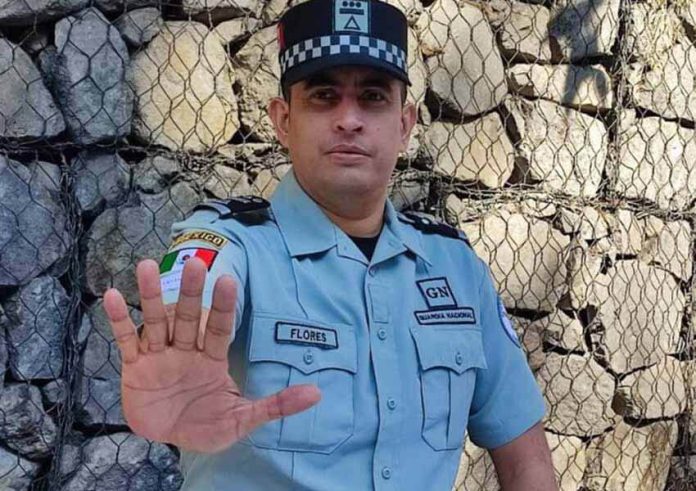Why can’t Mexico seem to punish anyone for crimes they commit?
Maybe because the people in charge of the functioning of the justice system either are criminals or enablers of criminals, which gives way to the same results.
This is the main question I have after reading about the appalling record of the newly formed National Guard — you remember, the federal law enforcement corps that was supposed to wipe corrupt police impunity off the face of the country?
As we can see, that is not what has happened. Most of them aren’t even certified to be in the National Guard (or doing any police work, for that matter) in the first place.
Which begs another question: how did they get in? Why is certification not a prerequisite for a uniform and a job?
My guess is that so few people want to do such a dangerous job that they’ll just let anyone in that shows up. And while the salary isn’t terrible at an average of 15,000 MXN plus benefits, it’s certainly not enough that I would want to risk my life to do it.
So to sum up: Guardsmen largely haven’t gone through any kind of proper training, and when they flat-out abuse the public they’re meant to serve and even their own institution – half of the complaints are for extortion, followed by abuse of authority, theft of National Guard assets, and general theft — they face no consequences for it.
With 988 probes launched since July 2019 and February 2022 (half of probes for extortion), a grand total of (drum roll, please…) two faced consequences!
That’s right; two ended in guilty verdicts.
¿Qué?
Our president, López Obrador, has made a big show since his entry into office of having “ended” corruption — and the National Guard, of course, is his darling. “I’m pleased because of the tranquility, the peace that is guaranteed in the capital of the republic” is his most recent comment denying the fact that there is not, in fact, guaranteed peace anywhere.
Indigenous communities especially remain unprotected. My God, people are asking narcos directly for help in finding their loved ones. That’s how little confidence the public has in Mexican security institutions.
What needs to happen for AMLO to recognize that there’s a problem? Recognition is of utmost importance: it’s impossible to find solutions to a non-problem.
To be clear, I’m not blaming the president for not ending violence and corruption in Mexico. What I am saying is that it’s irresponsible and counterproductive to go around crowing about the end of violence in Mexico when it’s clearly not true.
In doing so, he paints himself as either insincere or delusional and opaques the real accomplishments that have been achieved since he took office.
“There’s no more corruption.” The exception, of course, is when it comes from the “other side.” That’s corruption, says AMLO.
What is the other side, you may ask? Well, it seems that if an action is taken that he doesn’t approve of, the perpetrators are automatically “against the fourth transformation.” Convenient, right?
And just like López Obrador dragged scores of old, well-known corrupt politicians from other parties into his own government upon taking power, so have the various police forces around Mexico let in untrained, unvetted members.
What did anyone think would happen? It’s the usual suspects all around.
Might AMLO himself be an honest man in his own dealings? Maybe. Probably. But at this point, I don’t even care. If he can’t oblige government officials and those in charge of running our system of law and order to be honest and law-abiding, it simply doesn’t matter how good a person he is in private.
And constantly bragging about how corruption has been wiped away since he stepped into office is maddening to average citizens and particularly insulting to those who have first-hand, personal evidence that this assertion simply isn’t true.
But back to the National Guard, and police forces in general, who are essentially the first line of defense in terms of proving the president’s claims about violence and corruption.
Here are the problems to address:
- Certified officers: I suspect that if these institutions started insisting on the CUP (Certificado Único Policial) for new and current officers, they’d quickly find themselves incredibly short on recruits. I tried researching how to obtain it, and there’s precious little real, helpful information online about how to actually go through the process. Can anything be done online? Do people need to travel to take the courses? Are there prerequisites? How long does training last? Can it be part-time so you can keep doing your current job? How difficult is it?
Answers: absolutely no idea. So making sure all of this is clear and that anyone going into any of the armed forces can easily complete the process will help a lot. - Vetting: an acquaintance of mine had a job with the municipal police a few years ago. It was to interview police candidates and evaluate them psychologically to ensure they were apt for police work.
The stories this acquaintance told were hair-raising: there would be men who admitted (proudly!) to rape and murder who would somehow magically be given a badge even after strong recommendations against their hiring (and for their arrests).
The vetting process has got to be transparent. What is the point of letting actual criminals defend the law that they themselves have no respect for? - Salaries: A $15,000-peso salary isn’t terrible if you’re pushing papers in the safety of an office a few hours a day. But that’s not “please risk your life for your country” money. Higher salaries (like triple to quadruple higher to start) would dignify the job as it should be.
Surely, we can do better.
Sarah DeVries is a writer and translator based in Xalapa, Veracruz. She can be reached through her website, sdevrieswritingandtranslating.com and her Patreon page.
